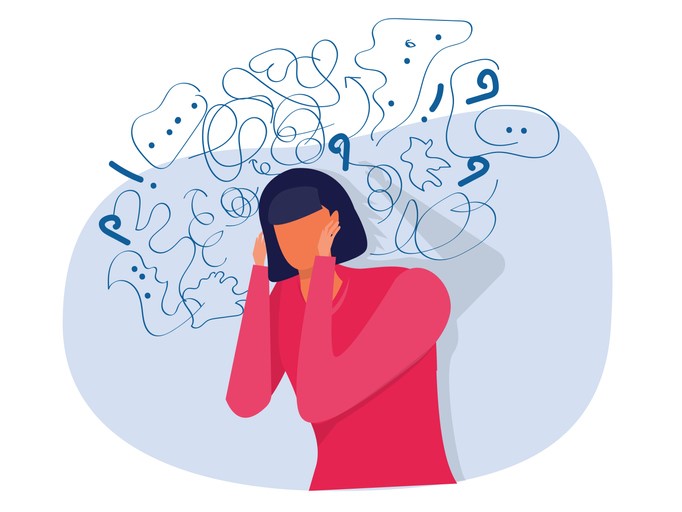
Can ADHD cause anxiety and depression?
Peer reviewed by Dr Krishna Vakharia, MRCGPLast updated by Amberley DavisLast updated 6 Oct 2023
Meets Patient’s editorial guidelines
- DownloadDownload
- Share
- Language
- Discussion
1 in 3 people with diagnosed ADHD have also experienced depression, and around 1 in 2 have anxiety. This strong link between ADHD, depression and anxiety is largely caused by the symptoms of ADHD which can make life a real struggle.
In this article:
Video picks for ADHD
According to CHADD (Children and Adults with Attention Deficit Hyperactivity Disorder), 1 in 3 people who have been diagnosed with ADHD have also experienced depression, and around 1 in 2 have anxiety disorders1. Those with ADHD are also five times more likely to try taking their own life2.
The relationship between ADHD, depression and anxiety
Attention deficit hyperactivity disorder (ADHD), depression and anxiety are often referred to as comorbid conditions, meaning you can have more than one at the same time. However, this description can be misleading because this suggests that these conditions all occur independently of each other - with little connection.
Yet, if you have ADHD and have feelings of depression or anxiety, it's thought that these emotions are a direct result of your ADHD - and the negative affect it can have on daily life. In turn, receiving better treatment for ADHD symptoms is likely to also improve your anxiety or depression3.
There are also other contributing factors:
Genetics - there are shared genetic factors between people with all three conditions, which may help explain why they often overlap4.
PTSD - up to 37% of adults with ADHD will experience PTSD (post-traumatic stress disorder) at some point5. PTSD also increases your chances of anxiety and depression.
ADHD medication - some ADHD medicines have a stimulating effect that may trigger anxiety. Stimulants also increase your dopamine levels, and levels that become too high - usually through over-use of medication - may cause depression6.
ADHD as a cause for depression and anxiety
Back to contentsThe main symptoms of ADHD centre around inattentiveness, hyperactivity and impulsiveness. These can make coping with life really difficult, especially when left untreated.
An inability to focus for people experiencing the 'inattention subtype' can lead to problems in both school and work. This can make it hard for people to reach their potential and often they are left feeling like underachievers. For those with the 'hyperactive-impulsive subtype', acting in a way that is considered either inappropriate or rude can hinder and damage relationships.
People with ADHD can have either or both of these subtypes. If you have both, you fall into the 'combined subtype'. There are many other aspects of ADHD that can make life more difficult, damage self-esteem, and can create feelings of hopelessness and despondency - common symptoms of depression. If you feel stressed trying to fit in with your peers, you're also more vulnerable to anxiety.
Continue reading below
Misdiagnosing ADHD
Back to contentsThere is overlap in the symptoms of ADHD, depression and anxiety which can make these conditions difficult to diagnose and treat. If someone with unrecognised ADHD is treated for depression or anxiety, the treatment has limited effectiveness, as the root cause of the symptom is not being addressed.
Other factors also influence misdiagnosis. Younger children and those born closest to the school start age are more likely to be diagnosed with ADHD, and boys are also more likely than girls to be diagnosed7.
This may be because boys are more likely to have hyperactive symptoms, which make them disruptive, while girls may be more prone to inattention. This makes girls with ADHD more likely to sit at the back of the classroom and daydream, but they're less likely to cause problems for others which demand action.
Although it is now thought that up to 65% of ADHD symptoms continue from childhood into adulthood8, adults who haven't been diagnosed as children are less likely to receive a correct ADHD diagnosis later on.
A failure to diagnose and, therefore, treat ADHD increases their chances of developing depression and anxiety disorders. To tackle this, the National Institute for Health and Care Excellence (NICE) guidelines recommend that doctors screen all patients displaying the signs of anxiety or depression for ADHD as well9.
Identifying a connection between ADHD, depression and anxiety
Back to contentsWhat happens when you have a dual diagnosis of ADHD and depression or ADHD and anxiety, or even all three? Doctors then need to determine if the conditions are comorbid or if the ADHD is causing the depression or anxiety. Doctors may ask a number of questions in order to determine the difference.
Has ADHD caused your depression?
If you are experiencing depression as a result of your ADHD, you may not display all the main features of major depression. Instead, you may believe that you wouldn't feel depressed if you had been able to accomplish certain goals that were instead made hard by ADHD. Sometimes this distinction can become apparent as your doctor asks you a range of questions.
Has ADHD caused your anxiety?
If you are dealing with anxiety as a result of your ADHD, your anxiety is likely to be triggered by circumstances that your ADHD symptoms affect. For example, you may have anxiety only around exams because your ability to focus and accomplish high results is affected by your ADHD. Doctors will be asking questions that determine if outside of ADHD-related concerns, your outlook is relatively more positive and calm.
Continue reading below
Treating ADHD, depression and anxiety in combination
Back to contentsIf you have both ADHD and depression and/or anxiety, many treatments work well with each other. Cognitive behavioural therapy (CBT), a talking therapy where the brain is coached to better deal with mood disorders, can be used to ease the symptoms of all three conditions.
Implementing a few lifestyle changes can also help to manage your symptoms. Establishing a good routine that includes getting good sleep, eating a balanced diet and incorporating stress-relieving exercises can make managing ADHD, depression and anxiety a lot easier.
Prescription medications can also help, but certain medications for ADHD may affect your sleep and appetite, which may negatively impact your depression. Your doctor can create a treatment plan that works best for your diagnoses, which may involve a combination of stimulants and non-stimulant drugs.
If you believe that you may be experiencing depression or anxiety alongside ADHD, speak to your doctor. They will be able to discuss the best treatment plan for you.
Further reading
Back to contentsPatient picks for ADHD

Brain and nerves
What are the signs of ADHD in women?
In school, boys are twice as likely to be diagnosed with attention deficit hyperactivity disorder (ADHD) as girls. Experts now believe that this gap isn't because more boys develop ADHD, but because many girls go undiagnosed. As ADHD diagnoses in adult women surge, we explore the differences in symptoms between girls/women and boys/men, as well as the signs grown women can look out for in daily life.
by Amberley Davis

Brain and nerves
Can diet affect your ADHD?
As more people are diagnosed with ADHD, there is growing interest in effective ways to help control its symptoms. One promising area of focus is nutrition, with emerging evidence suggesting that what you eat may play a role in managing the condition. We spoke to the experts for their take on whether your diet can impact ADHD symptoms.
by Victoria Raw
Continue reading below
Article history
The information on this page is peer reviewed by qualified clinicians.
6 Oct 2023 | Latest version
5 Nov 2021 | Originally published
Authored by:
Amberley Davis

Ask, share, connect.
Browse discussions, ask questions, and share experiences across hundreds of health topics.

Feeling unwell?
Assess your symptoms online for free
Sign up to the Patient newsletter
Your weekly dose of clear, trustworthy health advice - written to help you feel informed, confident and in control.
By subscribing you accept our Privacy Policy. You can unsubscribe at any time. We never sell your data.